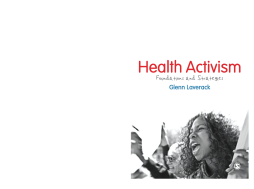
Additional Information
Book Details
Abstract
Activism is action on behalf of a cause, action that goes beyond what is conventional or routine and is relative to the actions by others.
Health activism is a growing area of interest for many who work to improve health at both national and international levels because it offers a more direct approach to achieve lasting social and political change. This book, for the first time, provides a clear foundation to the theory, evidence-base and strategies that can be harnessed to bring about change to improve the lives and health of others.
For anyone working to improve the health of groups and communities, this will be thought-provoking reading. It has particular relevance for postgraduate students and practitioners in public health and health promotion.
'This is a highly readable textbook on activism for health. It will be essential reading for students of public health and social policy, and for health activists themselves. The mix of theory and examples sustains interest and keeps the book grounded in real life' -
David Ross, London School of Hygiene and Tropical Medicine
'For all of you who want to improve your lives and who also want to address the world's problems and change things for the better, Laverack's book gives you everything you want to know about activism and how to be a health activist. Great book!'' -
Suzanne Jackson, University of Toronto
In Health Activism: Foundations and Strategies, Glenn Laverack provides both a “why to” and “how to” guide to health activism. He defines activism as an “action on behalf of a cause, action that goes beyond what is conventional or routine”. Laverack makes a persuasive case for how activism has a role in public health policy and practice. Laverack cautions that the promotion of individualism, privatisation of public services, and a decline in solidarity policies can undermine social processes that address social injustice in health, and he warns of conflict in less open political contexts. However, he also points to opposing trends.
The Lancet
